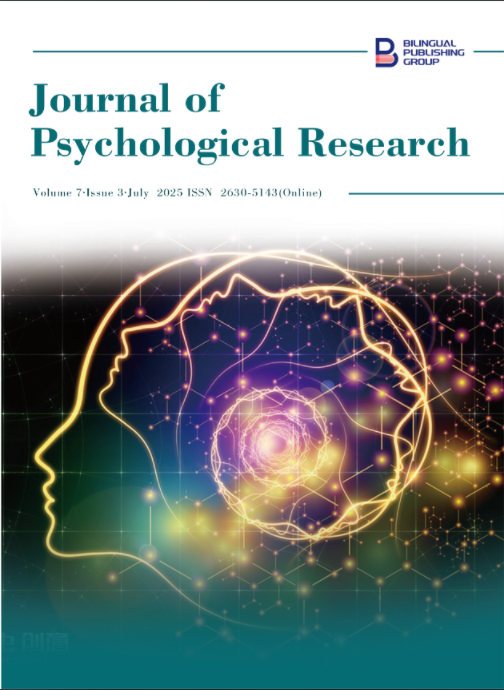-
682
-
617
-
375
-
296
-
294
Research on Emotional Expression of Students in Different School Stages Based on Speech Emotion Recognition
DOI:
https://doi.org/10.30564/jpr.v7i3.10275Abstract
From children to teenagers and then to adults, individuals' emotional expression ability has undergone significant changes. From the compulsory education stage to the general senior middle school stage, students' cognitive and emotional needs will change greatly. Students of different school stages show significant differences in their vocal emotional expression, which not only affects their social skills but also has important guiding significance for educational practice. Therefore, this study focuses on the vocal emotional expression of students at different school stages. This study explores the differences in vocal emotional expression among students at different school stages (primary school, junior high school, and senior high school), with a focus on the expression characteristics of different emotional types and the situation of inconsistent internal and external emotions. The research results show that in terms of emotional types, students at different school stages have a relatively high accuracy rate in expressing sadness, while the accuracy rate for expressing anger is the lowest, and the accuracy rate for expressing anger is significantly lower than that for other emotions. In terms of school stages, the overall accuracy of emotional expression among students improves with the increase of school stages, but the differences between school stages are not significant. In the task of expressing inconsistent internal and external emotions, the study found that senior high school students have significantly better emotional conversion ability than primary and junior high school students, indicating that as the school stage increases, students' adaptability in complex emotional expression tasks gradually improves.
Keywords:
Voice Emotional Expression; Grade Differences; Types of EmotionsReferences
[1] Wo, J.Z., Cao, L.Y., 2003. Development characteristics of middle school students' emotion regulation abilities. Chinese Journal of Applied Psychology. (02), 11-15.
[2] Morris, A.S., Criss, M.M., Silk, J.S., et al., 2017. The impact of pa-renting on emotion regulation during childhood and adole-scence.Child development perspectives. 11(4), 233–238.
[3] Wang, H., Zhu, X.M., 2018. On the three main misunderstandings of teachers' emotional expression in the present. Educational Sciences Research. (01), 50–52.
[4] Lu, J.M., Chen, N.Q., Xu, L., et al., 2016. A survey on t-he current situation of emotional intelligence among Chin-ese college students. Journal of Psychological Science. 39(06), 1302–1309. DOI: https://doi.org/10.16719/j.cnki.1671-6981.20160604.
[5] Lu, J.M., Liu, W., He, W., et al., 2017. The Current Status and Influencing Factors of Emotional Quality among Chinese College Students. Acta Psychologica Sinica. 49(01), 1–16.
[6] Gross, J.J., Levenson, R.W., 1997. Hiding feelings: the acute effects of inhibiting negative and positive emotion. Journal of Abnormal Psychology. 106(1), 95.
[7] Dai, J., Gu, X.Q., 2024. From Cognition to Emotion: Framework Construction and Application Research on the Impact of Feedback on Academic Emotions in Adaptive Learning Systems. China Educational Technology. (11), 78–86+122.
[8] Zeng, H., 2023. Action Research on Improving Young Children's Emotional Expression Ability through Creative Drama. Southwest University: El Paso, TX, USA. DOI: https://doi.org/10.27684/d. cnki. gxndx.2023.002197
[9] Ekman, P., 1992. An argument for basic emotions. Cognition & Emotion. 6(3–4), 169–200.
[10] Scherer, K.R., 2005. What are emotions? And how can they be measured? Social Science Information. 44(4), 695–729.
[11] Izard, C.E., 1994. Innate and universal facial expressions: evidence from developmental and cross-cultural research. Psychological Bulletin. 115(2), 288–299.
[12] Cowen, A.S., Keltner, D., 2017. Self-report captures 27 distinct categories of emotion bridged by continuous gradients. Proceedings of the national academy of sciences. 114(38), E7900–E7909.
[13] Scherer, K.R., 2003. Vocal communication of emotion: A review of research paradigms. Speech communication. 40(1–2), 227–256.
[14] Barrett, P.H., 2016. The Works of Charles Darwin: Vol 23: The Expression of the Emotions in Man and Animals. Routledge: London, UK.
[15] McCluskey, K.W., Albas, D.C., 1981. Perception of the emotio-nal content of speech by Canadian and Mexican children, adolescents, and adults. International Journal of Psychol-ogy. 16(1–4), 119–132.
[16] Kring, A.M., Smith, D.A., Neale, J.M., 1994. Individual differences in dispositional expressi veness:Dev-elopment and validation of the Emotional Expressivlty Scale. Journal of Personality and Social Psycholog. 66, 934–949.
[17] Ekman, P., Friesen, W.V., 1969. The repertoire of nonverbal behavior: Categories, origins, usage, and coding. Semiotica, 1(1), 49–98.
[18] Denham, S.A., 1998. Emotional Development in Young Children. Guilford Press: New York, NY, USA.
[19] Meyer, D.K., Turner, J.C., 2006. Re-conceptualiz-ing emotion and motivation to learn in classroom contexts. Educational Psychology Review. 18(4), 377–390.
[20] Saarni, C., 1999. The development of emotional competence. Guilford Press: New York, NY, USA.
[21] Zhu, X.M., 2007. An Outline of Emotional Education. People's Publishing House: Beijing, China.
[22] Liang, D.D., Yan, X.M., Ge, Z.L., 2024. A study on the development of emotion recognition ability based on linguistic cues in 4-8 year-old Chinese children with high-functioning autism. Psychological Development and Education. 40(02), 169–175.
[23] Chen, L., 2025. The influence of anger emotion education and training on the anger expression of lower grade elementary school students. [2025-05-09].
[24] Tan, H.N., Yang, Y., Zhang, H.J., 2014. An investigati-on of anger in junior high school students. Chinese Menta-l Health Journal. 28(5), 6. DOI: https://doi.org/10.3969/j.issn.1000-6729.2014.05.008
[25] Teodorescu, D., Fyshe, A., Mohammad, S.M., 2023. Utterance Emotion Dynamics in Children's Poems: Emotional Changes Across Age. arXiv preprint, arXiv:2306.05387.
Downloads
How to Cite
Issue
Article Type
License
Copyright © 2025 Qianwen Yuan, Yujie Chen, Wei Wang

This is an open access article under the Creative Commons Attribution-NonCommercial 4.0 International (CC BY-NC 4.0) License.




 Qianwen Yuan
Qianwen Yuan





